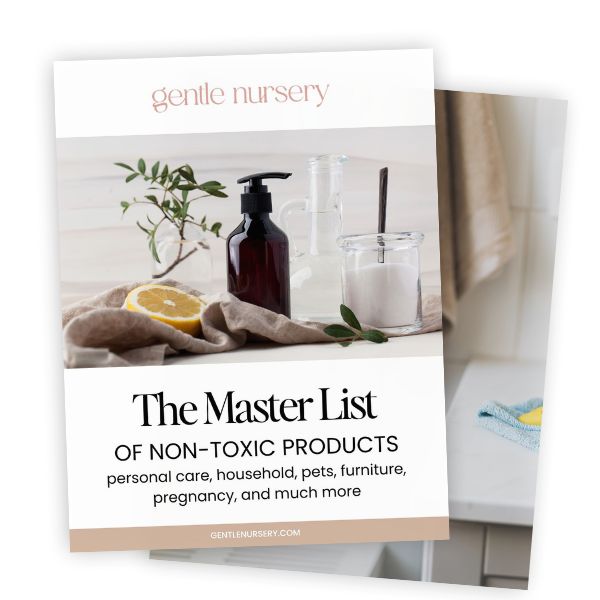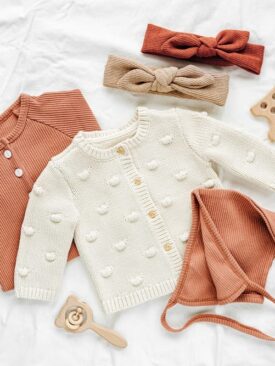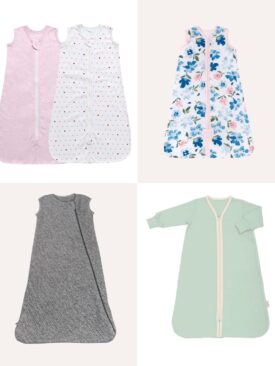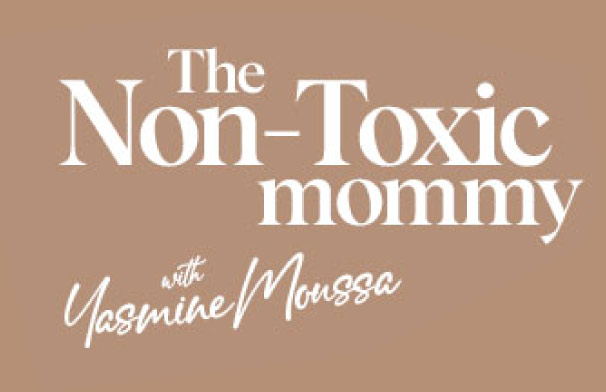When you’re shopping for the best natural products, take a close look at the labels and product descriptions. What you might not realize is how much marketing can trick us all. You’ll run into all kinds of tempting claims: organic, natural, hypoallergenic, non-toxic, etc. The list goes on. So, what’s a parent to believe and more importantly, what’s a parent to buy? This is where certifications become incredibly useful.
One of the certifications you can look for is a little green and white circular logo with the words Global Organic Textile Standard GOTS written around it. If your product has the official GOTS stamp, you can be assured that you’re not going to be fooled by any company’s false marketing ploys. Let me tell you, green-washing is rampant.
Becoming GOTS-certified is a process that ensures you’re using organic, natural materials that have been sourced ethically and sustainably from the raw materials to the finished product. Now, if you are a researcher like I am, and you look up GOTS, you’ll run into walls of text. It’s useful, but it also might require you to pull out your magnifying glass and find more than five minutes of peace and quiet (which, as parents, is very hard to come by!) So, I dug through all of the boring details to make it easier for you to understand and save you a bit of time. Read on!
The Problems with Textile Processing
The textile world is, quite frankly, hazardous. From agricultural cotton crops sprayed with pesticides through the factories that spray fabrics with chemicals, manufacturing and processing of all those cute baby clothes and blankets we find on store shelves are actually products sourced from a myriad of toxins. This affects farmers, manufacturers’ employees, and ultimately, everyone in the world.
I always urge people to think about the implications of these toxic conditions: we all live in the same world. We share the water, air, and soil. When toxins are released into our waters and soils, we are all exposed to them. So, it’s important to work as a community to increase our health standards and decrease the use of toxins that are linked to a host of serious health issues like cancer and congenital disabilities. Through buying GOTS certified items, we are supporting healthier manufacturing processes with ecological and social standards.
What Does GOTS Certification Mean?
GOTS stands for Global Organic Textile Standard, and it’s the worldwide leading textile processing standard for organic fibers. The GOTS certification goal defines worldwide requirements to ensure that textiles are actually organic no matter where they are made.
To receive this certification, companies must show that their process is organic from the harvesting of raw materials all the way through responsible manufacturing and labeling. This includes ecological and social requirements. During the certification process, every step of the textile chain is reviewed and examined.
Ultimately, this means that companies with GOTS certification are transparent and responsible. I trust this process entirely and regard GOTS certification as the ultimate assurance that I am using a reliable, organic product.
The Difference Between GOTS Organic and USDA Organic
Before launching into GOTS specifics, I want to first take a minute to go over the differences between GOTS organic and USDA organic. I’ve gotten this question a lot, and it can be super confusing when you’re buying items for your family and you see these listed (or missing) on labels.
USDA Organic
USDA organic is for USA-grown agricultural crops only. This means that you’ll mostly run into this label in the grocery store, but it’s true, some organic clothing can have this organic label as well. After all, cotton is a crop! USDA organic labels are regulated by the National Organic Program, which is part of the USDA Agricultural Marketing Services. This label means that at least 95% of your product is certified organic and does not allow the use of chemical additives like pesticides and fertilizers. But this is essentially where the organic standard stops. While the cotton crop might be organic, the final clothing product might be full of chemicals.
GOTS
The Global Organic Textile Standard extends to the global textile industry. This is especially important in countries like India, China, and Pakistan where laws do not restrict as many dangerous chemicals in manufacturing processes. The GOTS certification applies to the materials, the textile supply chain, and all social aspects of production. It starts with the fiber composition, which must be at least 70% organic, and moves to the dyeing and printing stages, along with the finish materials. GOTS even looks at wastewater management, as well as ensuring no coerced workers, right to collective bargaining, no child labor, and safe, hygienic working conditions.
Why USDA Organic and GOTS Can Be Confusing
It can be confusing because textile products that are GOTS certified can be sold in the United States as organic, but they might not have the USDA organic certification or seal. The bottom line is that that’s Ok! If a product has GOTS certification, it means every step of manufacturing from the raw materials to the final product is at least 70% organic.
Also, it’s worth mentioning that the process of receiving the USDA organic certification is formidable at best, with high costs that can make it a daunting, if not impossible, the process for small companies.
Why GOTS Certification Matters to You
There are a number of reasons that I urge you to look at the GOTS certification and regard it as an important part of the shopping you do for you and your family.
Organic is Really Organic
GOTS certified products will always be genuinely organic from start to finish. Companies that have this certification aren’t faking it or green-washing you so that they can profit. From raw materials to the final products, what you are buying will be high-quality, genuinely organic, and made with strict standards to ensure it’s safe for you and your family.
Health Safety for Farmers and Our Environment
If you care about what you’re purchasing and concerned how products might impact your health and your home, think about those that brought that product to life: farmers, manufacture employees, our waters, soil, and air. GOTS certification has set the bar higher and requires that workers and the environment are protected from all hazardous chemicals.
What Materials Can Be GOTS-Certified?
So, let’s jump into the GOTS certification process: the raw materials. The organic raw materials that can be GOTS-certified include:
- Cotton
- Silk
- Flax (linen)
- Wool
Note that GOTS doesn’t set its criteria for organic farming, but they do require materials used must be certified organic according to the farming standards. Only textile products made from at least 70% label grade “made with organic” or 95% “organic” certified raw materials can become GOTS certified.
How Do Companies Receive GOTS Certification?
There is a somewhat long process to become GOTS-certified. First, companies need to request to contact a GOTS approved certification body that is entrusted with the quality assurance system.
Key Factors to Become Certified
As I mentioned earlier, GOTS standards cover the processing, manufacturing, packaging, labeling, trading, and distribution of all textiles made of at least 70% certified organic natural fibers. To receive the certification, an on-site inspection is required by independent, especially accredited companies. Here are some things that they look at when giving the GOTS certification to companies.
Down on the Farm
GOTS certified products begin on the farm but are not regulated according to GOTS standards. That might seem confusing, so let me explain: Farmers are not regulated by GOTS, specifically, but rather the national organic standards. Any materials that become GOTS certified do require that the raw materials used (cotton crops, for example) are certified organic according to the set organic national requirements. If a product will become “organic” that means it contains 95% organic materials. If a product is “made with organic” the product contains at least 70% organic materials. And once the fibers go into the processing, GOTS begins to govern what and how processing works.
In addition to the materials grown, the environmental effects on the farm are very much part of the GOTS process. These farms use less energy and water use than typical farms, and their methods lock CO2 into the soil rather than releasing it into the atmosphere. These organic cotton growing methods produce 94% less greenhouse gas emissions.
To The Factory
All factories have regular inspections and are certified according to their processes as well as their strict social criteria.
Some of the most essential parts of the factory inspection include testing all chemicals for toxicity standards; the complete exclusion of dangerous toxins like heavy metals, phthalates, and formaldehyde; and making sure that accessories do not have nickel, chrome, or PVC.
Additionally, they evaluate the social criteria, which prohibits forced labor and child labor. They also make sure that wastewater is treated to ensure that water supply is protected and any chemicals from processing do not infiltrate the local community.
As you can see, the certification process and evaluation is thorough. And it happens annually! So, you can be sure that any product you buy with the GOTS certification is accurate and up-to-date.
Read Labels: GOTS-Certified Final Products
Last, but perhaps the most important for you, the end consumer: you want to see the GOTS-certification on the final product, not just the materials used.
If you see that a product says the yarn or fabric is GOTS-certified, that does not mean that the final product is GOTS-certified. For example, if a shirt says that it contains GOTS-certified cotton, that is a marketing claim only. Only finished products can be GOTS certified.
You can validate the GOTS certification by looking for the independent certification body and license number on the label.
I know, sometimes I, too, feel like a detective when shopping!
Here are some of our more popular articles that feature GOTS-certified products or brands:
- Best Organic Baby Clothing Brands
- Certified Organic Crib Mattresses
- Best Organic Mattresses for Kids and Adults
- The Master List of Non-Toxic Products
Final Thoughts
Purchasing GOTS textile matters, and honestly, it’s changing the industry. By searching for GOTS products, you are giving companies your money to help support the safety and health of farmers and workers; you are demanding organically grown products that are free of toxins and can be used without risk to our health, and you are encouraging environmentally safe practices. If money talks, buying GOTS-certified products speaks loud and clear: we want this type of accountability for companies everywhere.
Keep Reading:










Leave a Reply